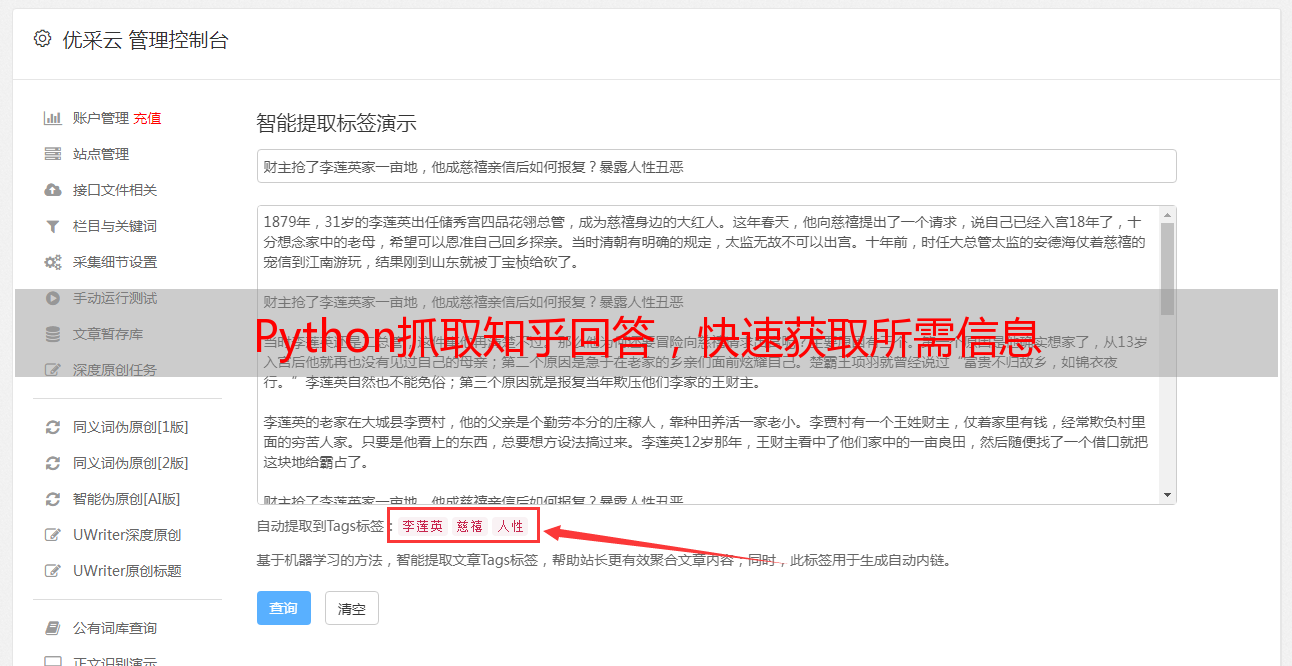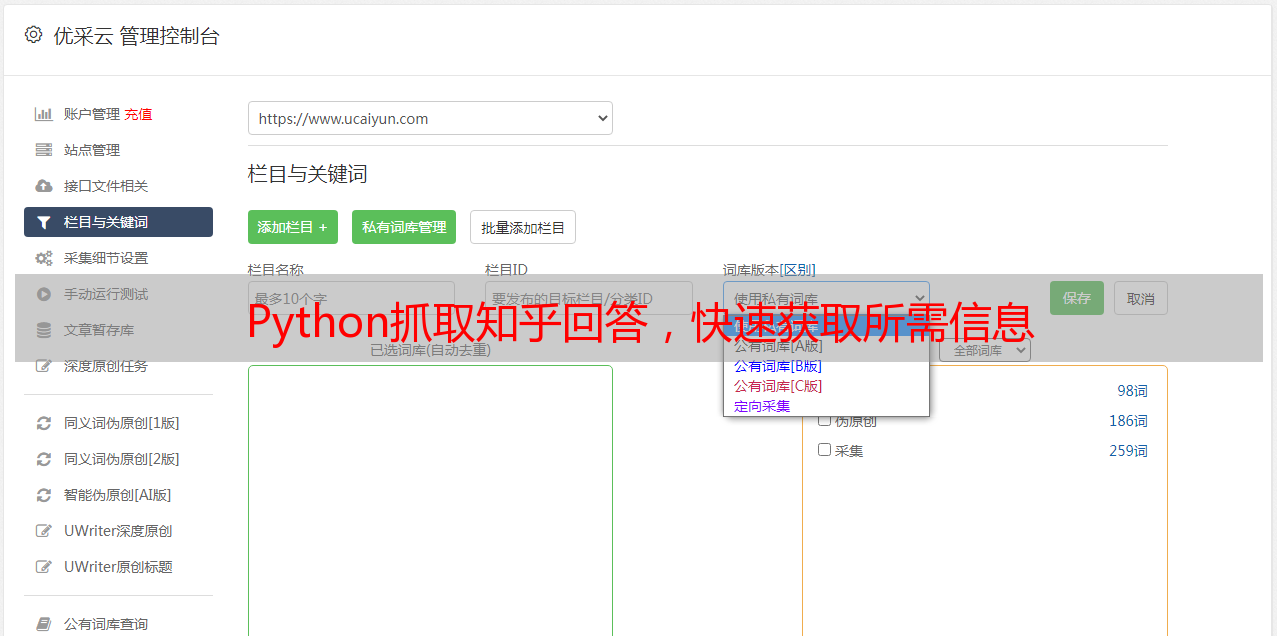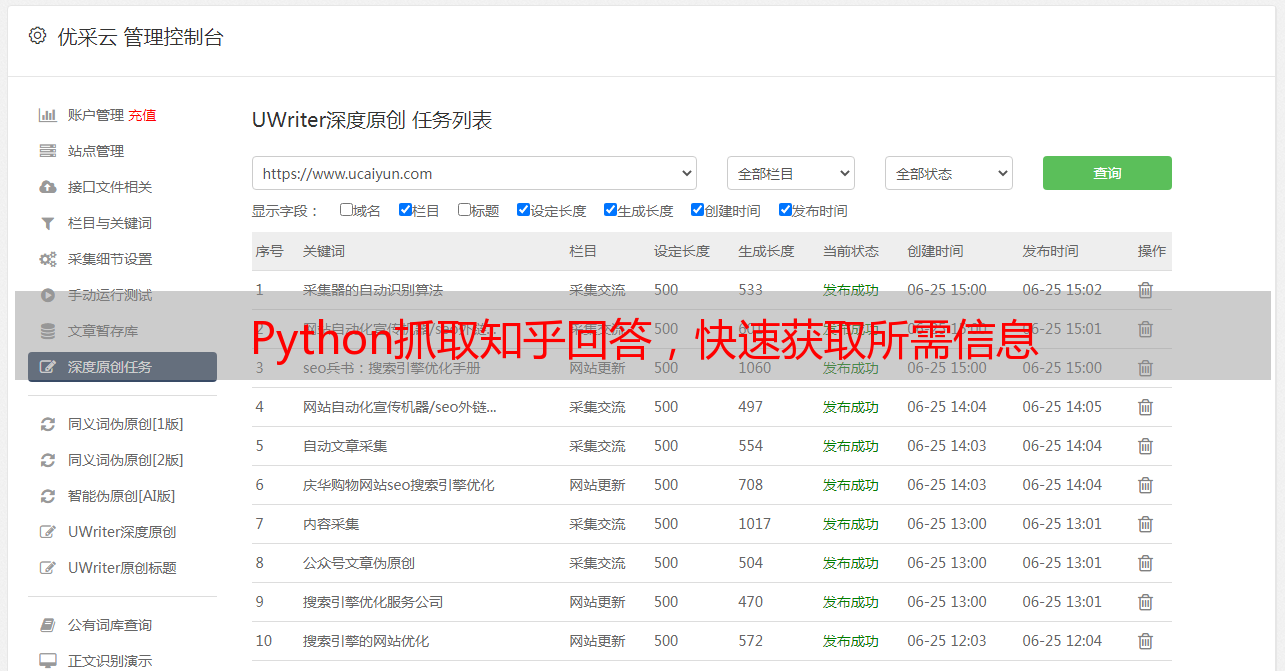Python抓取知乎回答,快速获取所需信息
优采云 发布时间: 2023-03-08 19:11Python 是一种被广泛使用的编程语言,它在数据分析、机器学习和自然语言处理等领域得到了广泛应用。而对于信息爬取领域来说,Python 更是一个难以替代的工具。本文将分享 Python 在知乎回答抓取上的应用技巧,帮助您更高效地获取所需信息。
一、了解知乎回答页面结构
知乎回答页面包括问题描述、回答列表和评论区三个部分。其中,问题描述部分包括问题标题、问题描述和关注人数等信息;回答列表部分包括回答用户、回答内容、点赞数和评论数等信息;评论区部分包括评论用户、评论内容和点赞数等信息。
二、获取页面源代码
Python 中使用 requests 库可以方便地获取网页源代码。使用 requests 库发送 GET 请求即可获取网页源代码,如下所示:
```
import requests
url ='https://www.zhihu.com/question/XXXXXX/answer/XXXXXX'
response = requests.get(url)
html = response.text
```
其中,url 为需要抓取的网页链接,response 为服务器响应对象,html 为网页源代码。
三、解析页面源代码
使用 BeautifulSoup 库可以方便地解析 HTML 网页源代码。通过对 HTML 标签属性的定位,可以实现对需要获取的信息的定位和提取。
四、定位问题描述部分
问题描述部分在 HTML 中一般位于`<div class="QuestionHeader-main">`标签中。使用 BeautifulSoup 库可以很方便地定位到该标签,并提取出问题标题、关注人数和问题描述等信息。
五、定位回答列表部分
回答列表部分在 HTML 中一般位于`<div class="List-item">`标签中。使用 BeautifulSoup 库可以很方便地定位到该标签,并提取出回答用户、回答内容、点赞数和评论数等信息。
六、定位评论区部分
评论区部分在 HTML 中一般位于`<div class="CommentItem-content">`标签中。使用 BeautifulSoup 库可以很方便地定位到该标签,并提取出评论用户、评论内容和点赞数等信息。
七、实例演示
以下是一个完整的 Python 程序,用于抓取知乎指定问题下所有回答及其相关信息:
```
import requests
from bs4 import BeautifulSoup
#抓取页面源代码
def get_html(url):
response = requests.get(url)
html = response.text
return html
#获取所有回答
def get_answers(html):
soup = BeautifulSoup(html,'html.parser')
answer_list = soup.find_all('div',{'class':'List-item'})
answers =[]
for answer in answer_list:
author = answer.find('span',{'class':'UserLink AuthorInfo-name'}).text
content = answer.find('span',{'class':'RichText'}).text.strip()
upvote_count = int(answer.find('button',{'class':'Button VoteButton VoteButton--up'}).find('span').text)
comment_count = int(answer.find('a',{'class':'Button ContentItem-action Button--plain Button--withIcon Button--withLabel'}).find_all('span')[1].text)
answers.append({
'author': author,
'content': content,
'upvote_count': upvote_count,
'comment_count': comment_count
})
return answers
#获取问题相关信息
def get_question_info(html):
soup = BeautifulSoup(html,'html.parser')
title = soup.find('h1',{'class':'QuestionHeader-title'}).text.strip()
description = soup.find('div',{'class':'QuestionRichText'}).text.strip()
follower_count = int(soup.find('strong',{'class':'NumberBoard-itemValue'}).text.replace(',','').strip())
return {
'title': title,
'description': description,
'follower_count': follower_count
}
#获取所有评论
def get_comments(html):
soup = BeautifulSoup(html,'html.parser')
comment_list = soup.find_all('div',{'class':'CommentItem'})
comments =[]
for comment in comment_list:
author = comment.find('span',{'class':'UserLink AuthorInfo-name'}).text
content = comment.find('span',{'class':'ContentItem-time'}).find_next_sibling().text.strip()
upvote_count = int(comment.find('button',{'class':'Button CommentItemVoter-button Button--plain Button--withIcon'}).find_all('span')[1].text)
comments.append({
'author': author,
'content': content,
'upvote_count': upvote_count
})
return comments
#主程序入口
if __name__=='__main__':
url ="https://www.zhihu.com/question/XXXXXX"
html = get_html(url)
question_info = get_question_info(html)
answers = get_answers(html)
#打印所有回答及其相关信息
for answer in answers:
print(answer)
```
八、总结
本文介绍了 Python 在知乎回答抓取上的应用技巧,并给出了一个完整的 Python 程序实现。通过学习本文所述知识点,您可以更加高效地获取所需信息。如果您想了解更多 Python 技巧,请关注优采云(www.ucaiyun.com)的文章。





